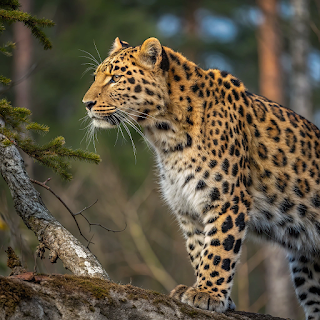The Struggle for Survival: Understanding Endangered Species and Their Conservation
Endangered species are those whose populations are at risk of extinction due to factors like habitat loss, poaching, pollution, and climate change. With each species that vanishes from our planet, we lose a part of the intricate web of life that supports our ecosystems. In this post, we’ll dive into what it means for a species to be endangered, why they matter, and how we can take action to protect them.
What Does "Endangered" Mean?
An “endangered species” is one that faces a high risk of extinction in the near future. The International Union for Conservation of Nature (IUCN) classifies species based on their risk of extinction, with categories ranging from Least Concern to Extinct. Here are some key classifications:
Critically Endangered: A species facing an extremely high risk of extinction in the wild.
Endangered: A species at high risk of extinction in the wild.
Vulnerable: A species that is likely to become endangered unless conservation efforts are made.
These categories highlight how urgent it is to address the threats to wildlife before they become irreparable.
Why Are Species Becoming Endangered?
There are several human-induced and natural factors contributing to the decline of species:
Habitat Loss
Deforestation, urbanization, agriculture, and infrastructure development destroy the natural habitats where animals live. When habitats are fragmented or destroyed, species lose their homes and resources, leading to population declines.
Poaching and Illegal Wildlife Trade
Many endangered species are targeted by poachers for their body parts, such as ivory, fur, and horns. The illegal wildlife trade has devastating effects on species like elephants, rhinos, and tigers, pushing them closer to extinction.
Pollution
Pollution from industrial waste, plastic, and chemicals can harm species by contaminating their water, air, and food sources. Marine animals, in particular, are severely affected by plastic pollution.
Climate Change
Climate change alters weather patterns, temperatures, and habitats. Rising sea levels, warmer ocean temperatures, and shifting seasons can disrupt migration patterns, breeding seasons, and food availability, causing species to struggle.
Overhunting and Overfishing
Human consumption of animals, whether through hunting or fishing, can deplete populations faster than they can recover. Overhunting also disrupts ecosystems, as certain species play crucial roles in maintaining balance within their habitats.
Why Do Endangered Species Matter?
The extinction of a species doesn't just mean the loss of an individual animal. It’s a loss for the entire ecosystem and for humans. Here's why every species counts:
Biodiversity and Ecosystem Health
Each species has a role in maintaining the balance of its ecosystem. When one species is lost, it can have a ripple effect, leading to the collapse of the ecosystem. For example, the decline of pollinators like bees can affect plants and crops, which in turn affects food supplies for humans.
Medicinal Value
Many plants and animals have been studied for their potential medicinal properties. For example, the venom of certain amphibians is used in the development of treatments for diseases like cancer and heart conditions. Losing these species means losing potential cures.
Cultural and Economic Value
Some endangered species are culturally significant to communities around the world. Moreover, ecotourism—visiting places to observe wildlife—can provide a sustainable source of income for local economies, helping to fund conservation efforts.
Examples of Endangered Species
Native to the Russian Far East and northeast China, the Amur leopard is critically endangered, with fewer than 100 individuals left in the wild. Habitat loss and poaching have been major threats to this elusive big cat.
The Vaquita, a small porpoise found in the Gulf of California, is considered the most endangered marine mammal in the world. With only around 10 individuals remaining, it is on the brink of extinction due to bycatch and illegal fishing activities.
Sumatran Orangutan
This great ape, found only on the island of Sumatra in Indonesia, is critically endangered due to habitat destruction, illegal hunting, and the palm oil industry. There are fewer than 15,000 individuals left.
Javan Rhino
Once found throughout Southeast Asia, the Javan rhino is now confined to a single national park in Indonesia. With fewer than 75 individuals left, this species is considered critically endangered, primarily due to habitat loss.
What Can We Do to Help?
The good news is that many organizations and individuals are working tirelessly to protect endangered species. But conservation efforts need global support. Here’s how you can help:
Support Conservation Organizations
Donate to or volunteer with reputable wildlife conservation groups that work to protect endangered species and their habitats. These organizations often work on the front lines, providing funding, research, and fieldwork to save wildlife.
Adopt Sustainable Practices
Support businesses and practices that promote sustainability. For example, avoid products with palm oil (unless it’s sustainably sourced), reduce plastic usage, and support eco-friendly brands.
Advocate for Policy Change
Call for stronger laws to protect endangered species, such as stricter penalties for poaching and better regulation of industries like fishing, agriculture, and logging.
Educate and Raise Awareness
Share information on endangered species and conservation efforts on social media, in your community, or through your blog. The more people know about the issue, the more likely it is that global attention and action will increase.
Participate in Wildlife Tourism Responsibly
When you travel, ensure that your visits to national parks or sanctuaries respect animal welfare and support sustainable conservation efforts. Responsible tourism generates revenue for protecting wildlife.
Conclusion
The survival of endangered species is intertwined with the survival of our planet. As we continue to impact the environment in unprecedented ways, it’s more important than ever to step up our efforts to protect the incredible creatures that share this world with us. By supporting conservation efforts, spreading awareness, and making more sustainable choices, we can ensure that these species don’t just survive but thrive for generations to come










0 Comments